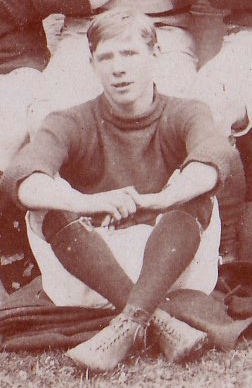A century on from the end of World War I we acknowledge their service …
Lest we forget.
Private William Isaac Lewis
Born: 1894 Maiden Gully, near Bendigo. Killed in action: 25 March 1917 Bapaume, France.
Enlisted: 2 August 1915 aged 21.
Served: Egypt and Western Front.
Also known as “Billy”, William was the youngest son of Caleb and Agnes Lewis. Billy’s mother died in 1897 aged just 34 and the children were subsequently brought up by their grandmother and older brother David. William’s father later remarried and moved to Berwick. William went too, but it seems he did not get along with his step mother and eventually struck out on his own.
According to his brother David, Billy became “highly respected and well liked, especially in Pakenham where he was employed by Mr P O’Halloran grocer up till the time he enlisted”. Billy was active in the Pakenham Football Club, playing in the 1914 premiership winning team with others who also enlisted, such as Frank Hornby, Andy Webster, Esca Gabbett and Bill Stone. Indeed, 50 years later, Bill Stone remembered Billy as one of the most talented footballers to ever play on the wing for Pakenham.
Billy was a 21 years “carter” when he enlisted in August 1915 and he ended up in France on the Western Front. There, the 7th Battalion fought at Pozieres and in the trenches of the Ypres Salient in Belgium during the Battle of the Somme.
In February and March 1917, the Germans strategically withdrew their troops to a new defensive line known as the “Hindenburg Line”. Following the German withdrawal, the Australian forces, entered the shattered town of Bapaume (which had been an objective of the Somme campaign) with little resistance.
Some of the Australian soldiers were billeted in the local “mairie” (town hall), including Billy. Unbeknownst to the Australians, the Germans had booby trapped the building, leaving behind a massive explosive mine on a delayed fuse. This exploded eight days later on 25 March 1917, killing 30 people. Only six men were pulled from the rubble alive. Amongst the dead was Billy Lewis.
News of his death was reported by Private Bert Ellett in a letter to his sister Alice, extracts of which were published in the Dandenong Advertiser newspaper: “I met Billy Gray (a Digger from Kooweerup) at Bapaume, and he told me that Fred Adams and Billy Lewis were both blown up with the Town Hall, and their bodies were never recovered. Bill had his bunk made down with them, but fortunately was not in”. Bert was one of the soldiers later deployed to clear the rubble of the town hall, dis-interring a body in the process.
Sadly, instead of bringing his family together, Billy’s death only seems to have heightened tensions within. After Billy’s father died, a dispute arose between Billy’s brother David and step mother Maud over entitlement to Billy’s war gratuity and war medals. Maud had received Billy’s war gratuity (an accrued lump sum payment due to each soldier based on the number of days they had served) on the grounds that she was his step mother. David contested her right to claim the money, arguing that it should be divided between his siblings instead.
Meanwhile, David, who was named as next of kin by Billy when he had enlisted, received Billy’s war medals, which Maud claimed were rightfully hers. The dispute was acrimonious. Maud even wrote to the Prime Minister, WM Hughes about the situation, while David involved the RSL. At one stage, it looked as if the Secretary of the Department of Defence was going to have to adjudicate, King Solomon-like, about the fate of the war medals, if the two parties could not agree. Unfortunately, the official files do not record the outcome.
This is an extract from Patrick Ferry’s book A Century After The Guns Fell Silent – Remembering the Pakenham District’s WWI Diggers 1914-18.
For more details on this and other profiles in the book, head to the website www.pakenhamww1.com







